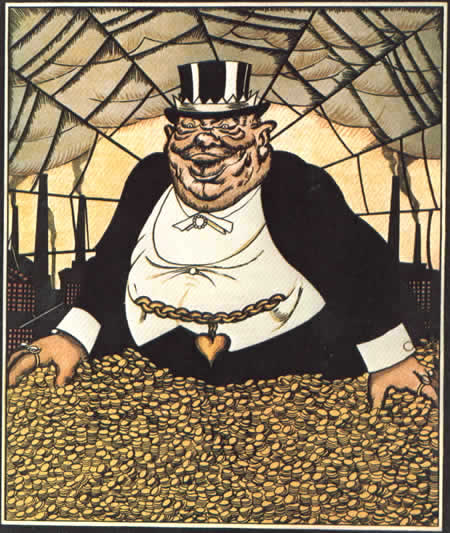

|
Role of Characters in the Criticism of Social Institutions Throughout
both Accidental Death Of An Anarchist and Catch 22, a wide
range of social institutions are satirised in order to position the
reader to acknowledge the farsical nature of these structures. In Fo’s
work, he concentrates on ridiculing institutions such as law enforcement
agencies and the judicial system. These criticisms are conveyed to the
audience during the passionate outbursts of the Maniac. In contrast to
this, Heller caricaturises characters whom he uses to act as metaphors
for social institutions and broader processes such as the military and
government bureaucracies. Please click a link navigate this section using the page tree below. Upon viewing each page, simply click "Back to top" to return to tree menu.
Fo’s use of the Maniac as the basis for social criticism: During
Act One Scene Two, Fo, through one of Maniac’s speeches, criticises
the injustices in the judicial system. Italy in the late twentieth
century is portrayed as being rampant with police corruption, where
“it is good to know that the judiciary is still the policemen’s best
friend” (p.159). These types of injustices are further highlighted
when the Maniac discusses the exploitation of workers in the capitalist
system, contrasting the unjust preferential treatment of judges in
comparison to blue-collar workers. These are just one of the many
scenes in the play where Fo satirises the corrupt nature of society’s
unjust hierarchical system, as those in the upper echelons of the
bureaucracy collaborate with one another to the detriment of the common
people.
Heller's use of Milo as a metaphor for social criticism
Above: A satire of the capitalist system Strong parallels from Fo’s criticisms of the nonsensical nature in which modern bureaucracies operate are also evident in Catch 22, for example through Heller’s use of the caricaturised character of Milo Minderbinder, a metaphor for the capitalist economic system. Milo is portrayed to the reader as being an abomination of human greed and callousness, an individual willing to sacrifice morals, ethics and values of humanity at the slightest whim, “so that (he) can make a profit” (p.272), while passing this off as being good for everyone. This is none more apparent than in the outrageously satirical scene in the novel when Milo bombs his own squadron. In this scene, Heller invokes a sense of outrage and horror in the reader, as the “wounded soon lay screaming everywhere. A cluster of fragmentation bombs exploded…and punched jagged holes…in the bellies and backs of a row of lieutenants and captains standing at the bar”, “engulfing them in a hellish apocalypse” (p.296). Yet
somehow, Milo, a metaphor for the capitalist
system, manages to justify
his blatant disregard for humanity by simply
“opening his books to the public and disclosing the profits he
made”, making the claim that “everyone in his syndicate gets a
share”(p.297). In reality, those like Yossarian who place their trust
in Milo, end up receiving a share of the carnage that capitalism can at
times wreck.
Heller's criticism of underlying social assumptions Heller
further emphasises the dehumanising aspect of the capitalist system, by
showing how Milo is willing to sacrifice anything, even writing off his
friendship with Yossarian, all in the name of profit. In another scene,
he organises a shady deal with Colonel Cathcart, so that other men not
only fly his missions for him, but also earn medals and ultimately
sacrifice their lives for him; for “if a replacement dies,
then…what’s fair is fair” (p.429). By demonstrating how these
types of “moral insanity” seem sane to many of the characters,
Heller presents an effective critique of the assumptions often
underlying our social structures and the gaps that are presumed, but are
never challenged.
Fo's criticism of the nature of bureaucracy
Above: The inherent nature of bureaucracies Fo
takes this one step further by suggesting that perhaps the dehumanising
nature of bureaucracy is inherent in our social system and that
individuals are powerless to rectify the situation. He presents the view
in Act Two Scene Two that nothing ever changes in the system, for
“scandal is the fertiliser of our social democracy” and it is only a
“libratory burp to relieve our social indigestion”, to defuse public
anger and ultimately present a form of “justice that is just that
little bit less unjust” (p.195).
Conclusions and the portrayal of futility
Above: Futility- a common feeling expressed in both texts This
feeling of hopelessness is further conveyed in both these texts by their
conclusions. Of course the exact endings of these texts will undeniably
be different, with Yossarian simply running away in a futile attempt to
escape the dehumanisation
of the system.
In contrast, the Maniac is resigned to the fact that nothing has,
or ever will change and he is simply forced to accept society for what
it is, albeit ridiculing it on his way. However in both Fo and
Heller’s work, neither Yossarian, who has refused to submit himself to
the system for so long, nor the Maniac who has poked fun at social
institutions during the entire play, are able to find meaningful solutions to
counter the feelings of futility and despondency with the system.
Summary of the role of characters in providing social criticism Overall
while different social institutions and characters were used as the
basis of these author’s social criticisms, there are indeed strong
parallels, which can be drawn in the messages they are both conveying
about the dehumanising mechanical machine, that is our bureaucratic
system.
|


